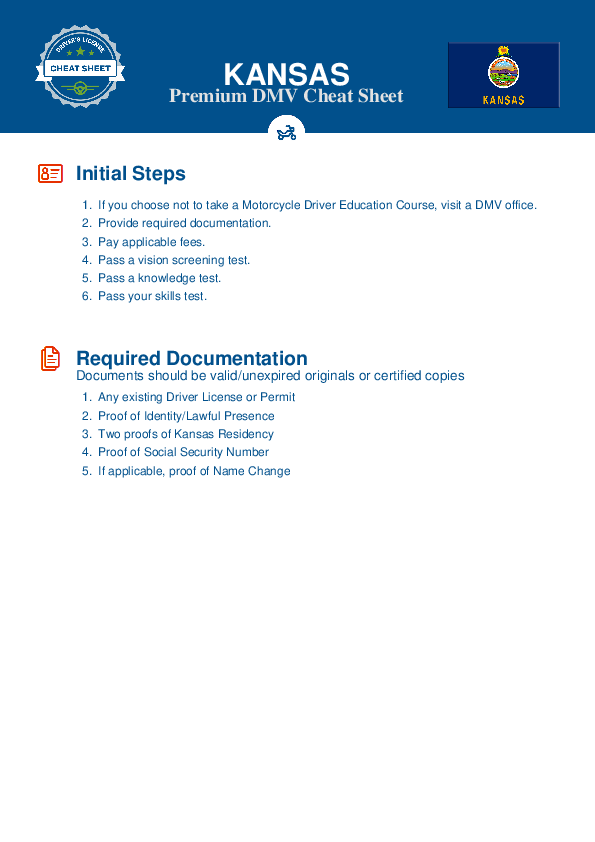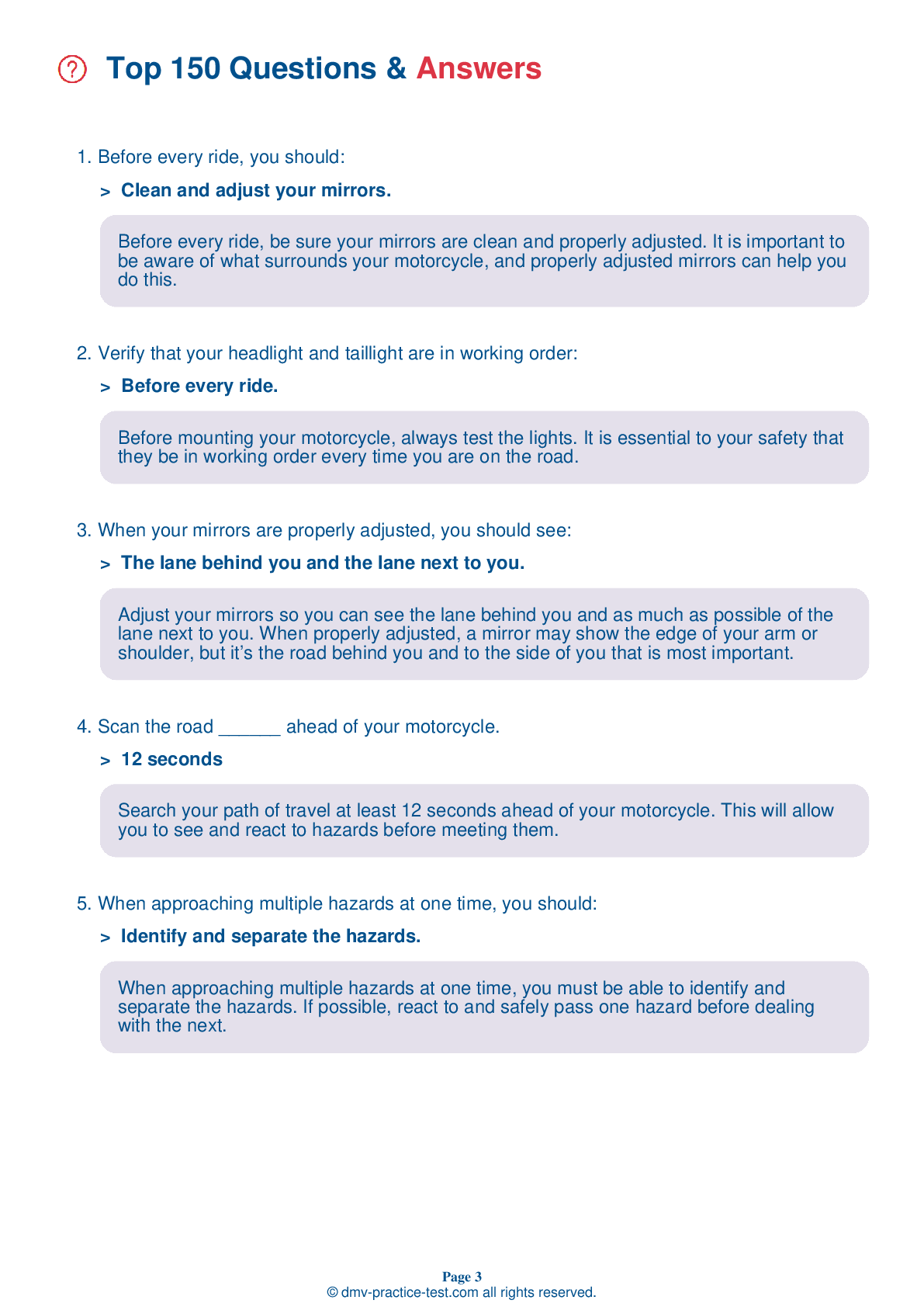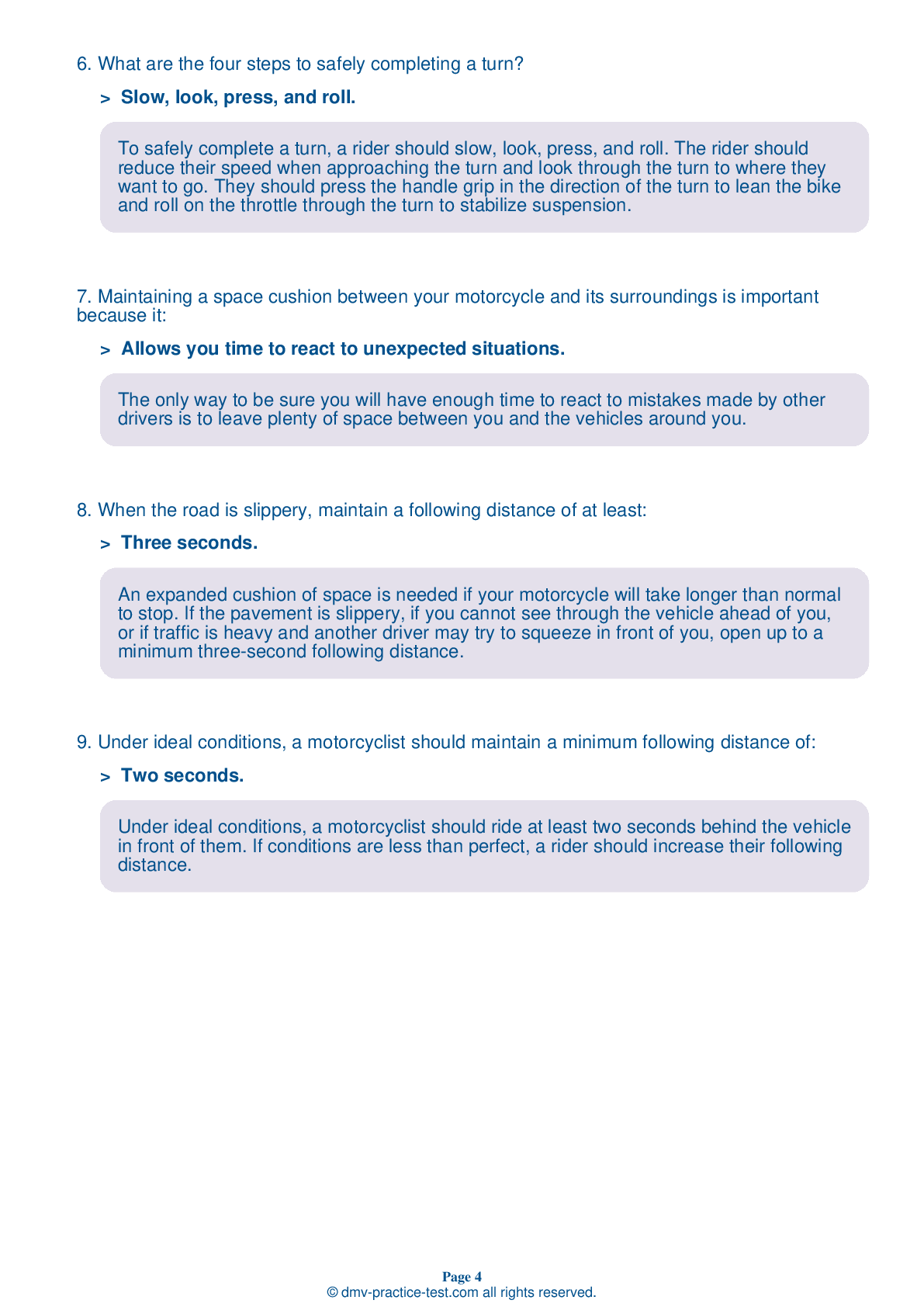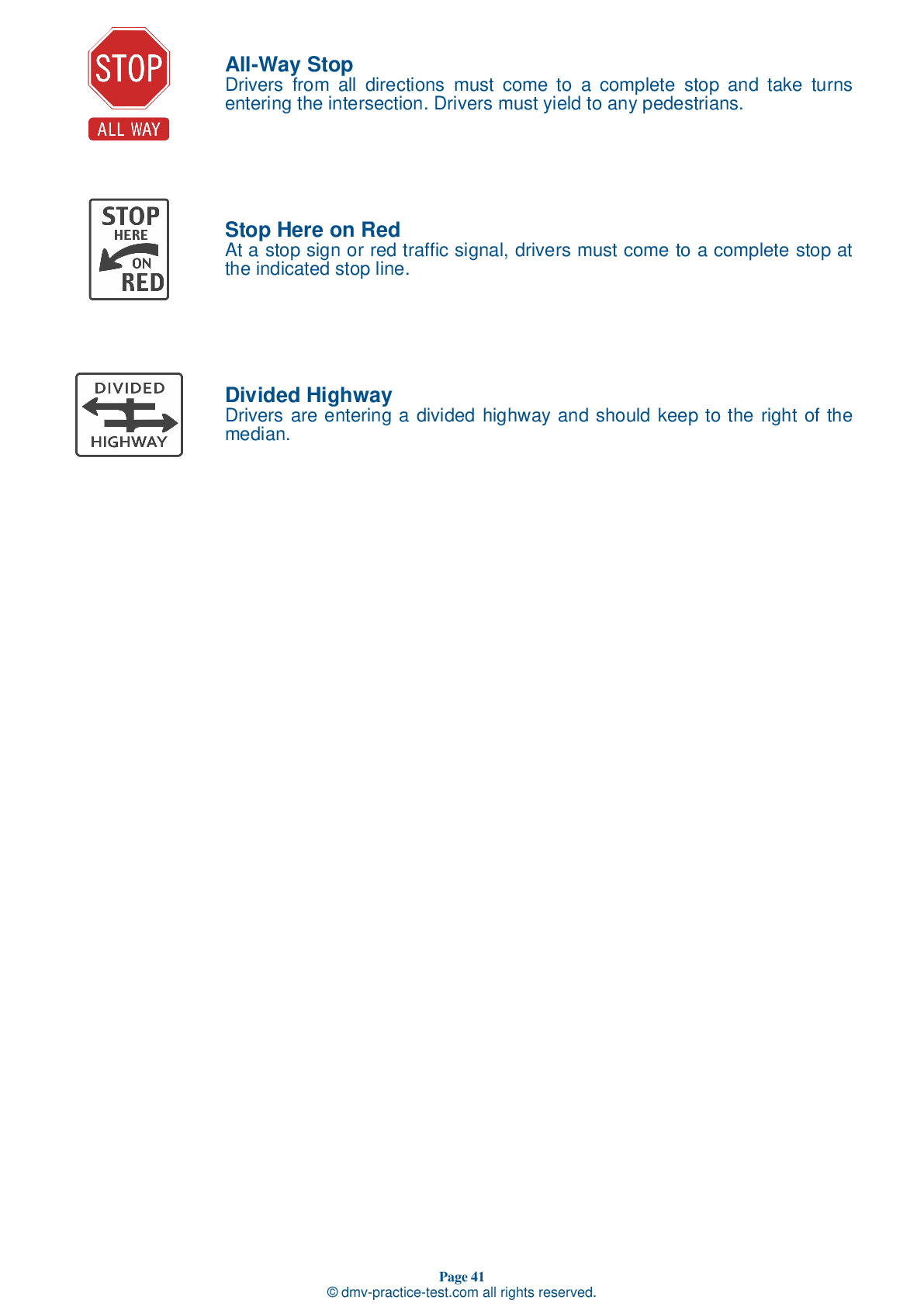DMV Permit Test #9
Motorcycle Test | License KS 2026 | FREE Online Practice! #9
Take this FREE motorcycle test (license in KS 2026) to check your knowledge of the road rules. To improve your results, download a motorcycle handbook online, study theory, and practice for free on our website. Still worried about how to get a motorcycle license in Kansas in 2026? Check our website for more sample tests, train as much as possible, and boost your grades!
25
20
16
1 . If your front wheel locks while you are stopping, you should:
If your front wheel locks while you are making a quick stop, release the front brake immediately and then re-apply it firmly. Use both the front and rear brakes if you need to stop quickly.
2 . When riding with a passenger, you may need to adjust:
It is a good idea to add a few pounds of pressure to your tires if you plan to carry a passenger. You should also adjust the suspension to handle the additional weight.
3 . When preparing to ride with a passenger, instruct the passenger to:
Ask your passenger to wait to mount the motorcycle until after you have started the engine. They should sit as far forward as possible without crowding you and firmly hold onto your waist, hips, or belt.
4 . When riding a motorcycle, your lane position:
An appropriate lane position can increase your ability to see and be seen. Being properly positioned in a lane can also help you avoid blasts of wind coming off of surrounding vehicles.
5 . A DOT-compliant helmet:
While some people believe that a helmet will limit their vision, this is not the case. Any U.S. Department of Transportation-approved helmet will allow the wearer to see as far as is needed for safe riding.
6 . Which of the following is not recommended as protective apparel for motorcycle users?
When riding a motorcycle, it is highly recommended that you wear protective apparel. Clothing that may help protect a motorcycle user in the case of a crash include long-sleeved jackets; long, heavy pants; over-the-ankle, closed-toe boots; and full-fingered leather gloves. It is a good idea to cover as much skin as possible when riding a motorcycle.
2026 Kansas | Frequently Asked Questions
To obtain a motorcycle license in Kansas, you must first pass a written test to receive a motorcycle instruction permit. After practicing with the permit, you can take the on-cycle skills test to receive your license. Alternatively, you can complete a Motorcycle Safety Foundation course, which waives the need for the on-cycle skills test at the DMV.
In Kansas, the minimum age to obtain a motorcycle license is 16. However, if you're under 18, you must first have a motorcycle instruction permit for at least 6 months, complete a state-approved motorcycle driver's education course, and have parental consent. These rules ensure young riders have the necessary skills and experience before getting their full motorcycle license.
Yes, in Kansas, you need a dedicated motorcycle license or endorsement added to your existing driver's license to legally operate a motorcycle. This requires passing both a written and on-cycle skills test, or successfully completing an approved motorcycle rider education course. This ensures you understand the rules and safety precautions associated with riding a motorcycle.
To apply for a motorcycle license in Kansas, you need to provide several documents: proof of identity (like a birth certificate or passport), proof of Social Security number, and proof of Kansas residency. If you're under 18, you'll also need to provide a parental consent form. Always check with the local DMV for the most current requirements as they may vary.
Yes, in Kansas, you'll need to take a written exam for a motorcycle license unless you've completed an approved motorcycle safety course. The written test covers topics such as traffic laws, safe riding techniques, and road sign identification. It's designed to ensure you have the knowledge necessary to operate a motorcycle safely on public roads.
The Kansas motorcycle written test covers a variety of subjects related to motorcycle safety and operation. Topics include traffic laws, road signs, safe riding techniques, handling dangerous situations, and the effects of alcohol and drugs on riding. The test is designed to ensure you have the knowledge necessary to operate a motorcycle safely on Kansas roads.
In Kansas, completing an approved motorcycle training course can indeed waive the written and riding skills tests required for obtaining a motorcycle license. However, it's important to verify with the local Department of Motor Vehicles (DMV) or course provider as rules may vary. Always remember, the aim is to ensure you're a safe, knowledgeable rider.
To enroll in a motorcycle training course in Kansas, first find a Motorcycle Safety Foundation-approved course near you. You can do this by visiting their website. Once you've found a course, you'll need to register, typically online or by phone. Courses often require payment upon registration. Make sure to check the requirements, some courses may require a permit or equipment.
No, you don't need to own a motorcycle for the license test in Kansas. You can use any motorcycle as long as it's street-legal, in good working condition, and you have permission to use it. However, remember that the motorcycle must be transported to the test site legally, which typically means using a trailer or having a licensed rider drive it.
Yes, you can use a friend's motorcycle for the Kansas driver's license evaluation. However, the motorcycle must be street-legal, registered, and insured. Remember to bring the proof of insurance and registration to the test. Also, ensure you're familiar with the motorcycle and can operate it safely.
Yes, in Kansas, the driving exam for motorcycles tests specific handling skills. These include the ability to balance, steer, and control the speed of the motorcycle. You'll also be tested on your ability to perform maneuvers like sudden stops, turns, and swerves. The exam assesses your overall ability to safely operate a motorcycle under various conditions.
In Kansas, new motorcycle drivers are subject to a few restrictions. If you're under 18, you must complete a motorcycle driver's education course and hold a motorcycle instruction permit for at least one year. During this period, you cannot carry passengers, and you must not ride between sunset and sunrise. These limitations are lifted once you turn 18 and get your full license.
Yes, your Kansas motorcycle license allows you to ride a motorcycle in other states. This is due to the Full Faith and Credit Clause of the U.S. Constitution, which requires each state to recognize the public acts, records, and judicial proceedings of every other state, including driver's licenses.
In Kansas, only riders aged 17 and below are required by law to wear a helmet while operating a motorcycle. However, it is highly recommended that all riders, regardless of age, wear a helmet for their own safety. Helmets significantly reduce the risk of serious head injuries in the event of an accident.
In Kansas, there are two types of motorcycle licenses: Class M and Class L. Class M is for motorcycles and autocycles, while Class L is specifically for motor-driven cycles with engines of 130cc or less. The type of license required depends on the type and size of the motorcycle you plan to ride.
Yes, you can add supplementary endorsements to your motorcycle license in Kansas. These include adding a commercial driver's license (CDL) or a school bus endorsement. However, each endorsement requires passing additional written and skills tests. It's recommended to check with your local DMV for specific requirements and procedures.
Yes, the Kansas motorcycle license test is available in multiple languages. However, it's advisable to contact your local DMV office in advance to confirm the availability of the test in your preferred language. They can provide the most accurate and up-to-date information regarding language options for the test.
The most effective strategy to prepare for the motorcycle license test is to study the Kansas Motorcycle Operator Manual thoroughly. This manual covers all the information you need, including road rules and safety practices. Additionally, taking practice tests online can help familiarize yourself with the format and type of questions you'll encounter on the actual test.
Yes, the motorcycle written exam in Kansas can be taken in languages other than English. These include Spanish and several other languages. However, it's advisable to contact your local DMV office ahead of time to ensure they offer the test in your preferred language.
If you don't pass the motorcycle written test in Kansas, you are allowed to retake it. However, you must wait at least one day before attempting again. It's recommended to study the Kansas Motorcycle Operator Manual thoroughly before retaking the test to increase your chances of passing.



